

With much of the world in lockdown, many of us are working from home much more than we have been used to. So what are the best ways of surviving, succeeding and even flourishing in this new normal? We've talked to clients and colleagues and listened to experts to put together some ideas which we hope you'll find useful.
Firstly, there is no one size fits all recipe. We are all different and what works for one person doesn't for another. Our jobs, our home situation, our preferences are all different, so whatever you read here or elsewhere, don't take it as a rule, but see whether or not it fits to your circumstances. We are all learning more about ourselves and each other in these days and we'll need to continue to learn and adapt and adopt new habits as we go. Be flexible and forgiving to yourself and others.
We've found it helpful to think about Connecting, Disconnecting and Focus.
In self-isolation, we are missing our usual connections, both social and business. So it's important to make extra effort to connect with people. Use this time as a great opportunity to strengthen connections and reconnect with people you haven't talked to for a while. Video calls are great tools, and instead of using the phone, make a video call on Skype, WhatsApp, Facetime, Zoom, Microsoft Teams, Google Duo or whichever method works best for you. In our OneWorld Consulting team we are all keeping Microsoft Teams open during working hours and a quick informal video call is a great way to connect.
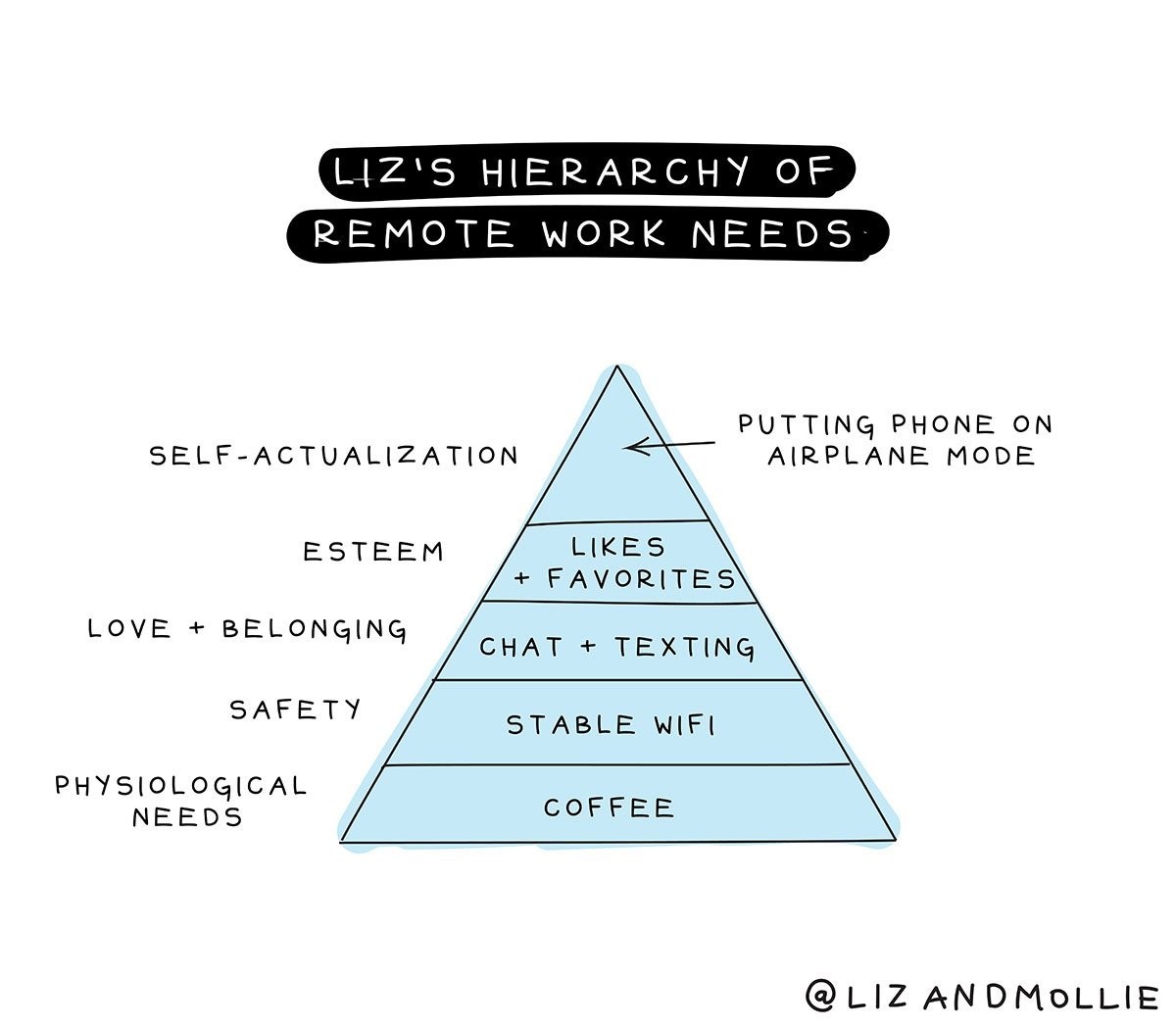
While you are working at home your routines are different from normal. A lot of people find it useful to make some new routines.
In our working lives the boundaries between work and non-work have become increasingly blurred for many of us. Now we are working from home that boundary can almost disappear. Some of this is inevitable and we should all be relaxed about kids appearing in the background (or foreground) of our video calls and other new experiences! It's nice to avoid the commute and wear what we want, but the lack of boundaries can lead to the risk of work taking over all our personal time. People we are talking to are currently working longer hours and more intensely than usual, and it can be helpful to set some boundaries, to protect both your work time and personal time.
Sticking to a routine of normal working hours can be a good idea. Be in work mode from 9am to 6pm or whatever works for you, but then switch off from work outside those hours. If you are checking and replying to messages late into the evening and over the weekend, you won't get the periods of disconnection that you need. We are realising that this period is a marathon not a sprint, and you need to look after your own physical and mental health. A key part of that is disconnecting and resting. Move your phone away from you when you are relaxing in the evening. If you absolutely have to check messages do it every hour and pause before replying; can it wait til you are back in work time? And remember that smartphones do have airplane mode (and an off button) and it's there to be used!
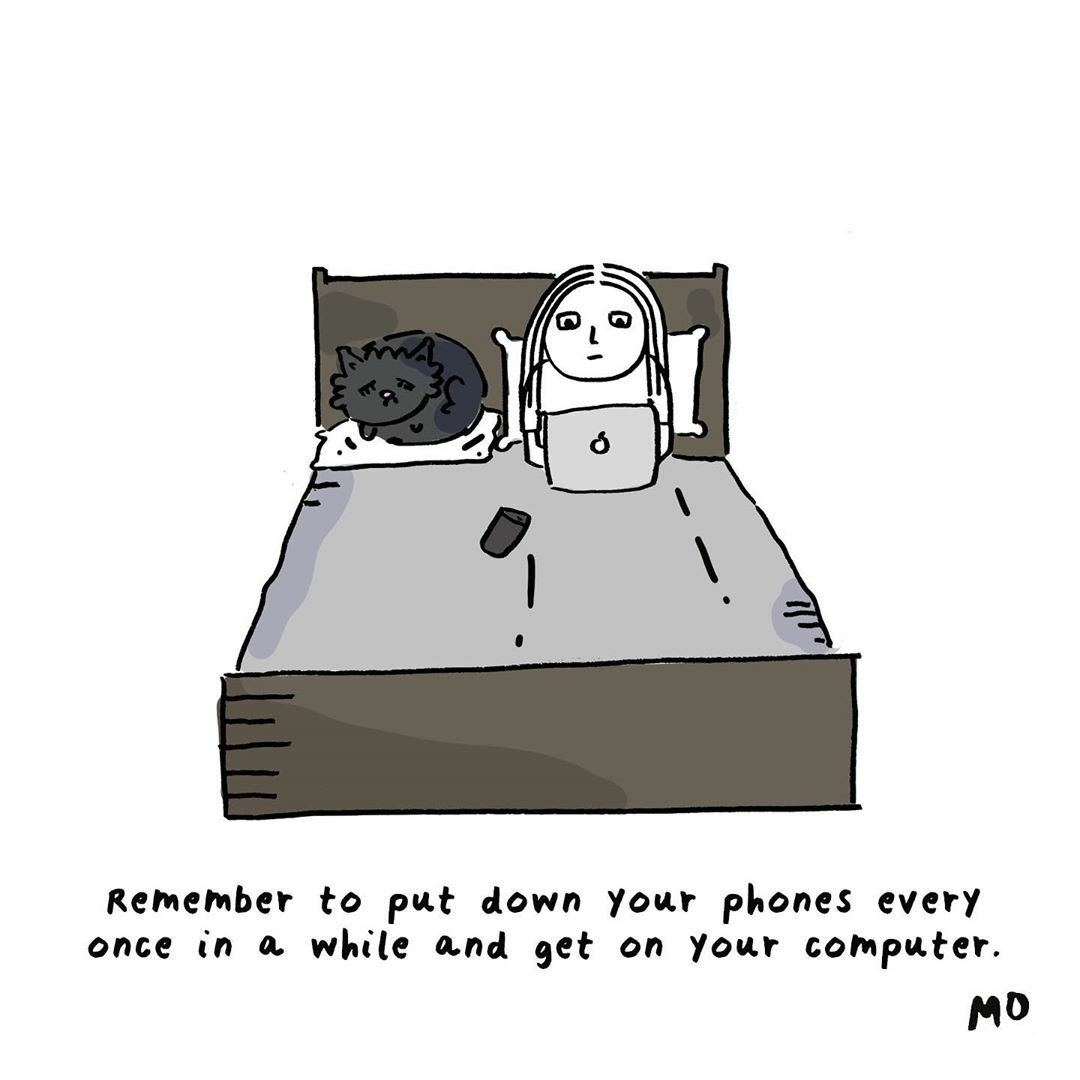
It's ok to not be working all the time, and you can set your Out of Office message to tell people when you are taking some time off and that they can reach you by phone if there's something urgent.
A lot of our executive coaching clients have the unhealthy habit of being ‘always on'. One way to improve is to set at least some hours where you don't check messages. After 8pm at night? During the day on Sunday? Even short periods when you disconnect will help.
Disconnecting from work can mean connecting with others around you, or with yourself. In these days some people are alone all the time, others are squeezed into busy households. If you are in the latter group, do make some time to be alone, and don't be shy to say you need it.
Focusing is a challenge for lots of us at the moment. We spend time at our home desks, but how much real work are we getting done? Build your own habits that help you focus when you need to. Set aside a space at home where you can work. Even if it is just a kitchen table, treat it as a workspace during the day. Then when you have finished work, pack your computer and work things away.
When we work at home, we miss some of the routines of the office and some people are spending long periods in front of their screen without a break (of course it depends who else is at home with us!) Again, you need to find out what works for you and experiment with different approaches. No-one can focus effectively all day, and you need to build regular breaks into your day, and periods of full focus. When you are focusing, switch off the interruptions. Reduce the notifications on your computer and phone and check messages at regular intervals, not all the time. Plenty of research shows that multitasking doesn't work, what we actually do is ineffective multi-switching between tasks and Devora Zack has some great advice on how to improve our focus.
Notice how your own productivity fluctuates, and schedule your most important work for your best periods of the day. The Pomodoro Technique of working in 25 minutes bursts with 5 minute breaks developed by Francesco Cirillo works for many people.
LinkedIn Learning has some good free videos on effective remote working including on mastering the technology effectively.
People are telling us that their To Do Lists are getting longer rather than shorter these days. Accept that you are never going to be caught up on everything at work, and as Art Markman recommends focus on what you have accomplished and practice self-compassion and acceptance of your current situation.
Building better habits is hard and can seem impossible. But we can build our willpower and learn to manage distractions better. One of the techniques that works best for me is Leo Babauta's recommendation to pause before switching what you do. You are writing an email or a report and then you get the urge to check social media or the latest news. Stop. Make yourself pause for 5-10 seconds. Take a deep breath. Think about whether you really want the interruption or is it better for you to focus on your current task. Then choose what to do. Choose right, most of the time.
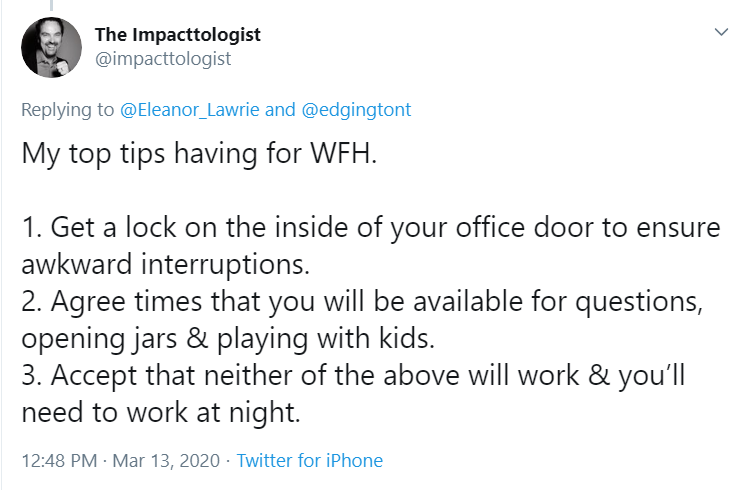
Some of us find apps like Forest (the virtual trees die if you play with your phone!) can help keep us focused. We haven't yet tried Focusmate, which connects you by video with a random focus partner and you both commit to spend 50 minutes focused on whatever you need to be doing. Of course you could try the same with one of your actual friends!
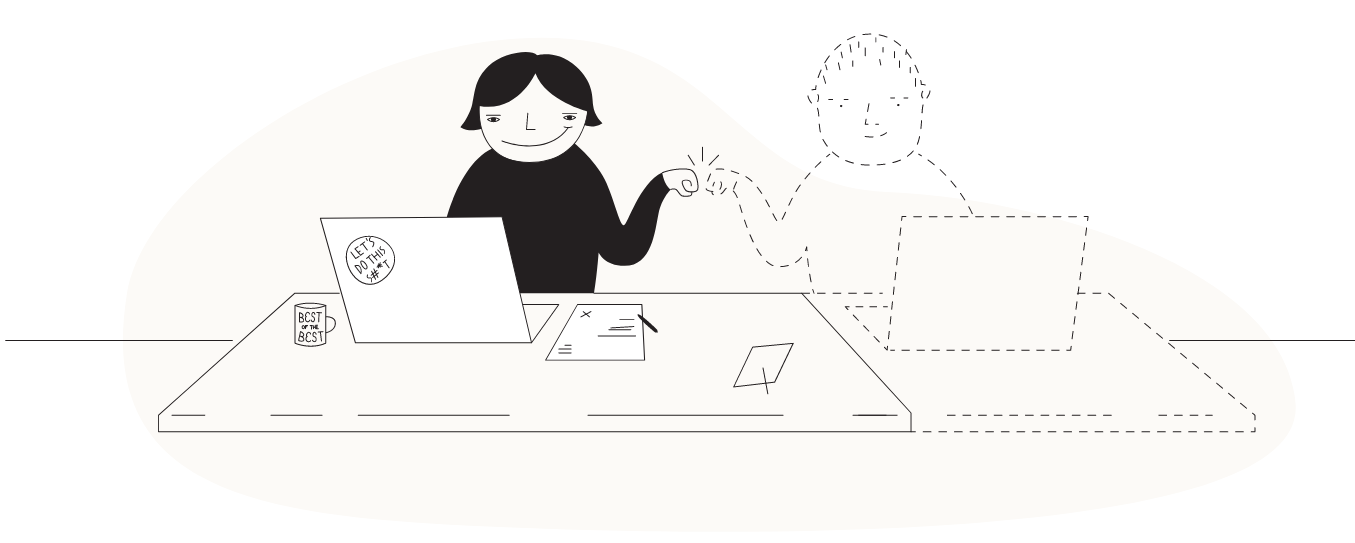
In today's situation it's helpful to disconnect from rolling news. Choose a few sources that you trust and read them regularly (twice a day?), but avoid the constant updates of actual and fake news via TV, the internet or WhatsApp which will depress you and distract you from other things you want to do.
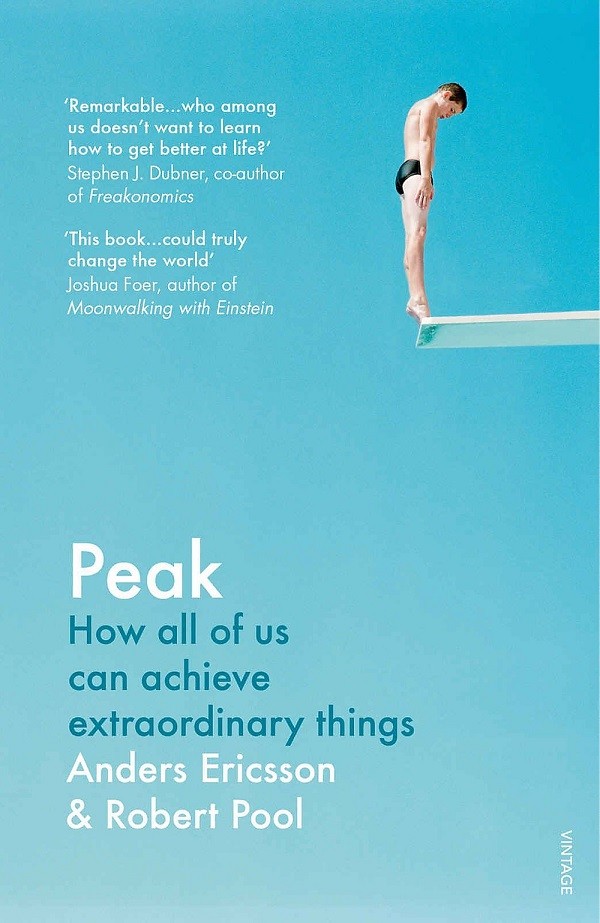
Anders Ericsson's work on top performers shows that world class competitors limit the intense parts of their training routine to 4 hours per day, and build in regular rest. To be able to fully focus at times we need to rest as well. In these days that can be harder to achieve. Try having a proper lunch break, disconnect from your technology and sit somewhere different while you have a break. Attention is a mental muscle and can be strengthened with the right practice.
Mindfulness can mean different things to different people, but there's no doubt that simple mindfulness practices can help us with focus, attention and disconnecting. There are great free resources from risingminds and mindfulnessworks. The app headspace is offering free tools at the moment.
Leo Babauta has some great suggestions for Meditating in these Crazy Times and shows how just two minutes of focusing on your breathing can really help. And if you are too busy or too distracted to meditate read this.
And if mindfulness or meditation feels too fluffy for you, try this technique from the US Navy Seals which only takes 16 seconds!
One of our favourite practices at the moment is taking a Mindful SNACK by Carla Naumburg.
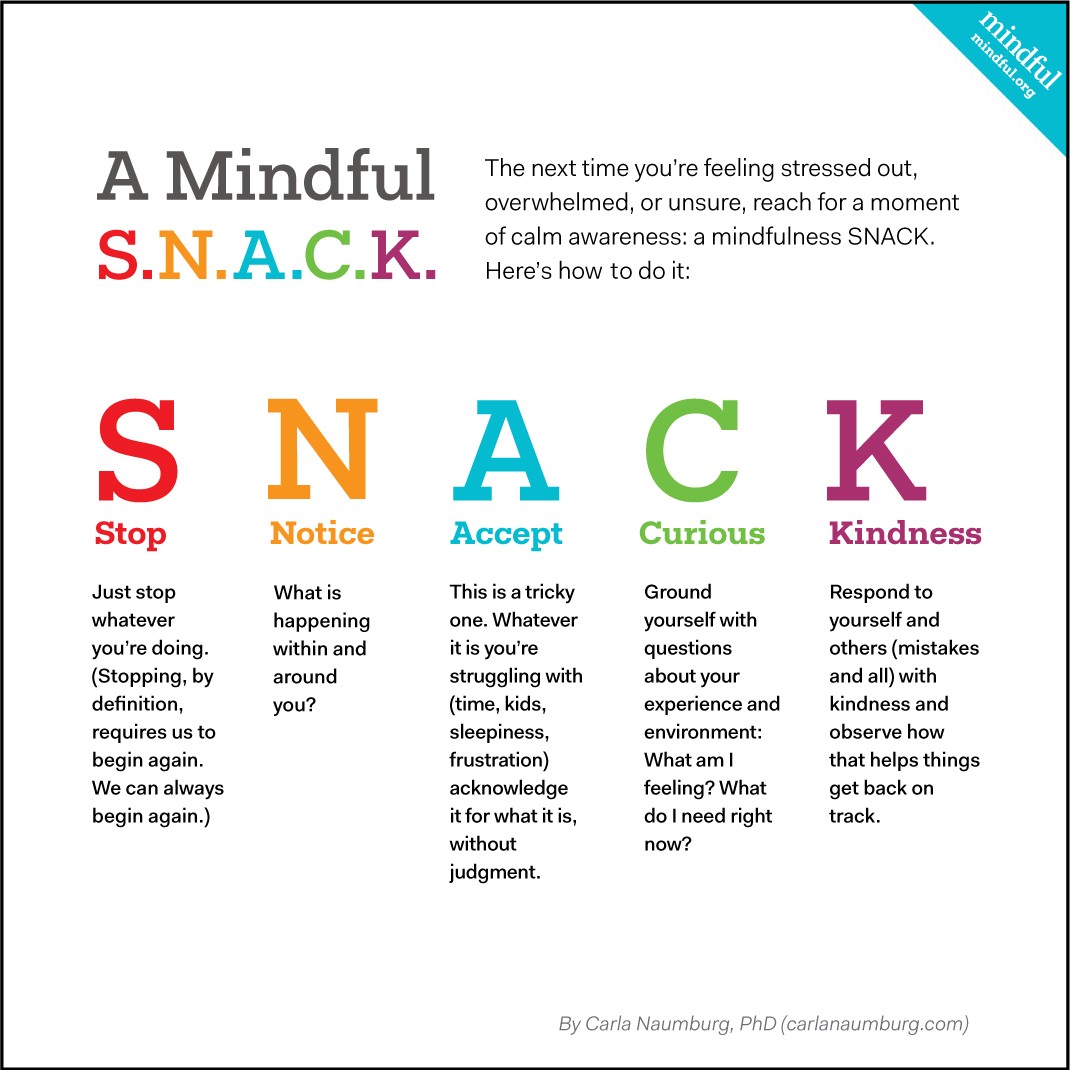
There are lots of things we have learnt from positive psychology over the years and the current crisis is a time to apply what we've learned. One thing that we know that works is a gratitude exercise. Liz Hall and others have been sharing on social media what they are grateful for on a particular day. Writing down three things that have gone well for you today can make a great positive impact on your wellbeing and remind us that there are probably many people in a much worse situation than ourselves!
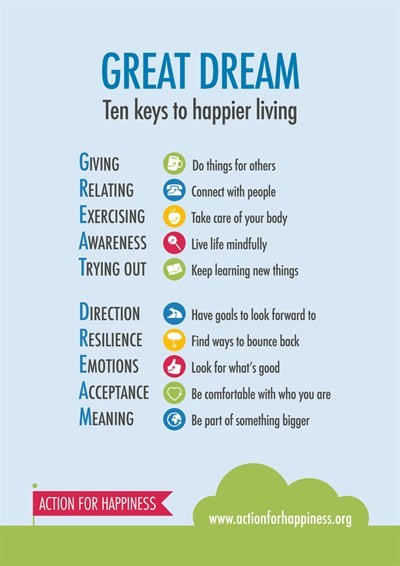
Pay attention to your own and others' mental health. These aren't normal days and they take emotional and psychological adaptation. A great source of free ideas, resources and support is Action for Happiness. Their Coping Calendar is really helpful and we love their current motto of Keep Calm. Stay Wise. Be Kind. For those with children, Childline is a great free resource.
It's ok to not be ok. We will all have ups and downs and we won't all use our free time to be super productive. Action for Happiness has specific advice for this period here. Be willing to reach out and ask for help and support when you need it.
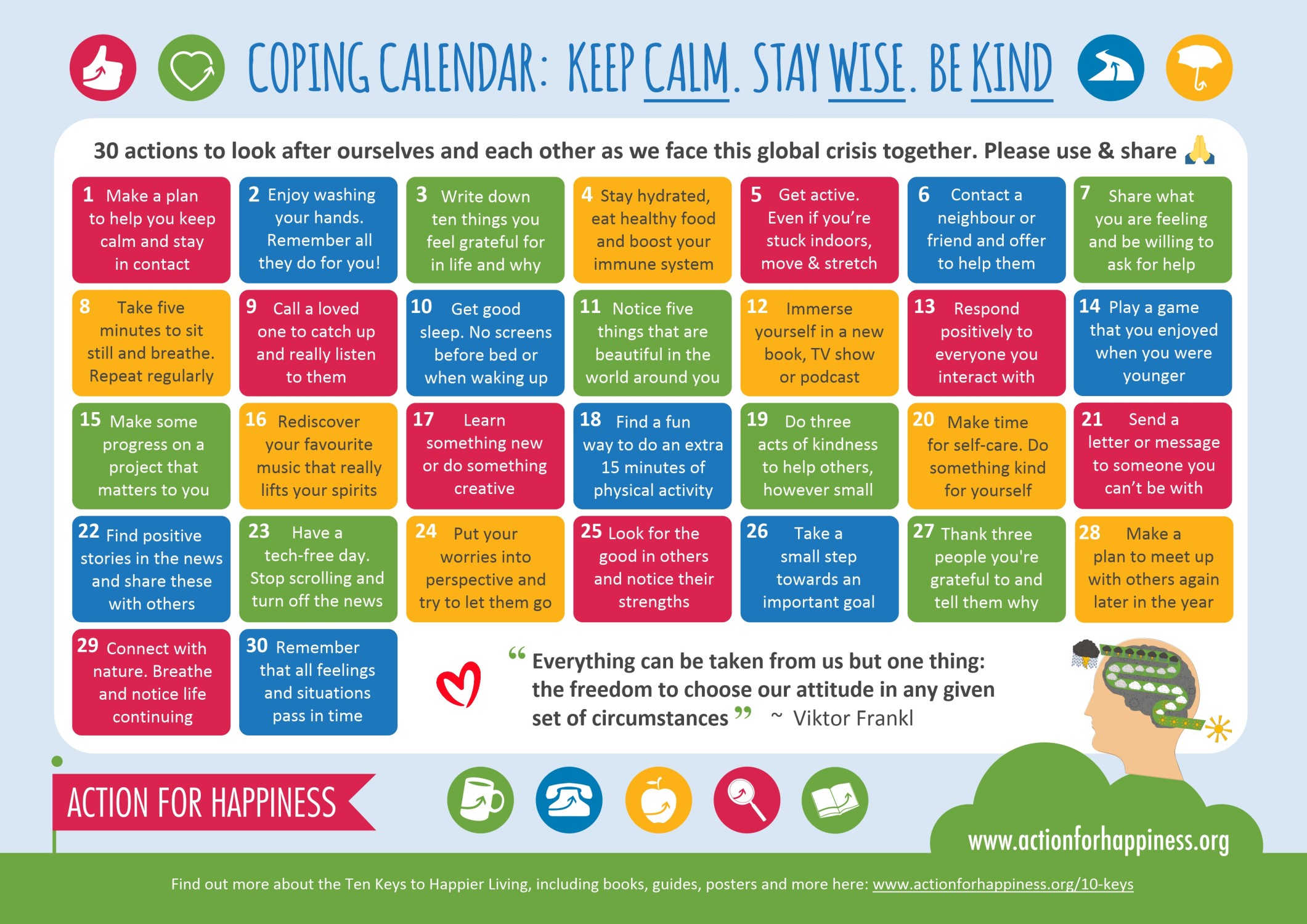
As well as our mental health we need to pay attention to our physical health in these days at home. We know that sitting is the smoking of our generation and it's important not to stay seated for long periods. Stand up and move regularly. Use headphones so that you can move around when you are on calls. If you set up your home working space so that sometimes you can work standing up that's even better. (Try piles of books for your laptop and an external keyboard and mouse on your table.)
Whatever you do pay attention to the ergonomics of how you are working, and change position often.
Gyms are closed but that's no excuse not to get any exercise. The UK has a new national hero, Joe Wicks and his #PEwithJoe live sessions are keeping the nation fit. They are all on his Body Coach channel on YouTube.
There are loads of free online sources for home exercise activities. And having no equipment is not a problem with Jessica Ennis-Hill's bodyweight routines.
Being at home all day can help us adopt some healthy habits. We have often tried to eat dinner earlier, but fail because of work commitments. Now is the time we can eat our last meal of the day earlier, which is a great way to help avoiding gaining weight in these days. Getting regular and plentiful sleep is critical to maintaining good physical and mental health.
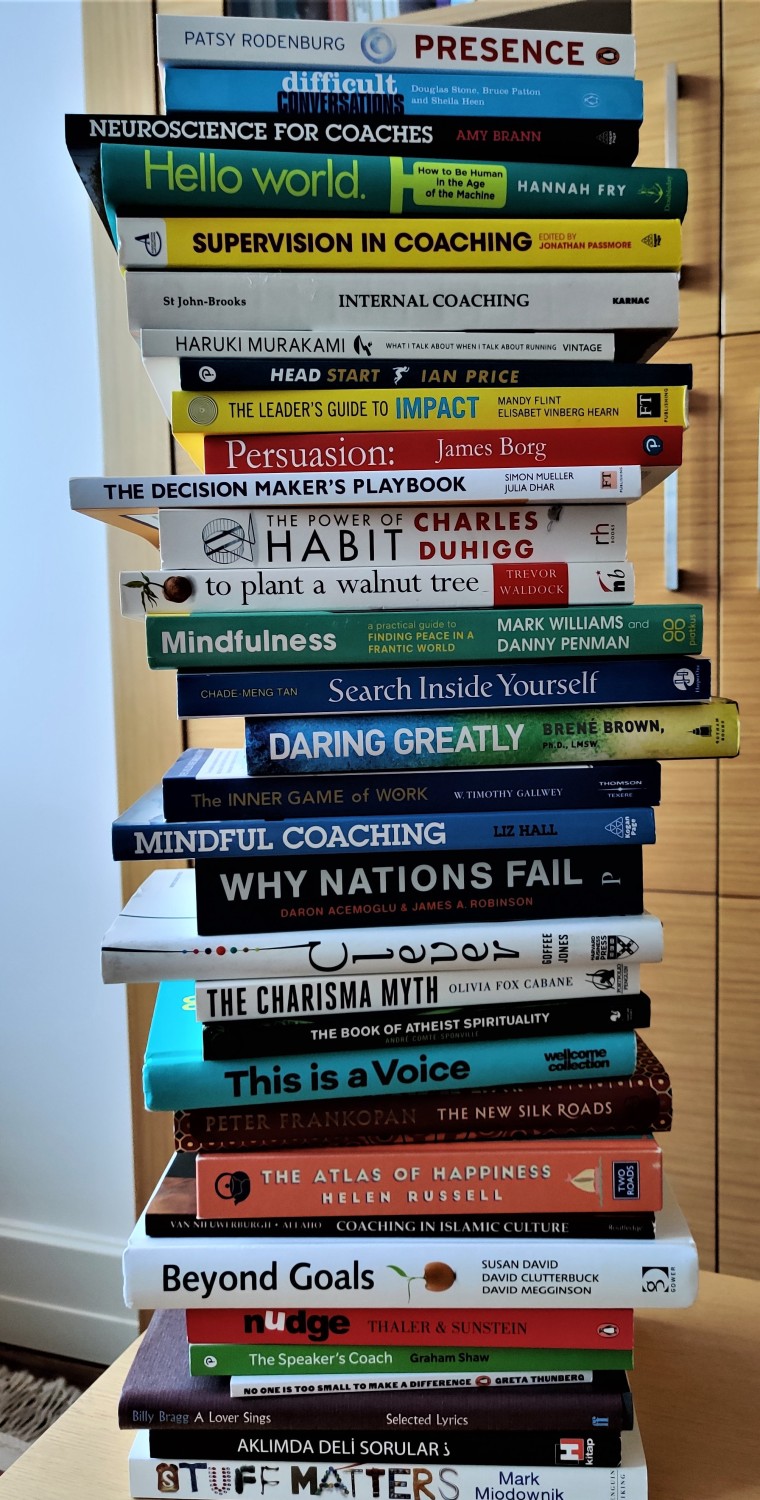
You finally can read some of those books you have waiting for you. There are hundreds of free resources for learning online, for whatever your preference is. Ted Talks, LinkedIn Learning, Coursera, Udemy, Harvard Business Review, HBR Türkiye, MIT Sloan Management Review, strategy+business, McKinsey Quarterly and many others have endless material, both free and paid for.
The English Channel from the British Council has loads of free videos to watch including some exercises to develop your English skills, including this song from Stormzy.
Cambridge Assessment International Education has shared free resources for parents and children learning at home and lots of other institutions such as Tink Türkiye are doing the same.
It's also a great time to listen to podcasts for fun or learning. Two of my favourites for taking my attention away from the crisis for a while are Freakonomics and The Infinite Monkey Cage.
And finally lots of online sources have suggestions for how to spend our free time in these days. This is one of our favourites.
Stay safe, keep calm, be wise and kind to yourself and others. Observe yourself and others and notice how you are adapting and what you are learning.
Please share your comments, suggestions, links and corrections below, so that we can all benefit from each other's wisdom.
This article is now also available in Turkish.
Source: https://www.linkedin.com/pulse/connecting-disconnecting-focus-what-we-learning-working-tim-bright/